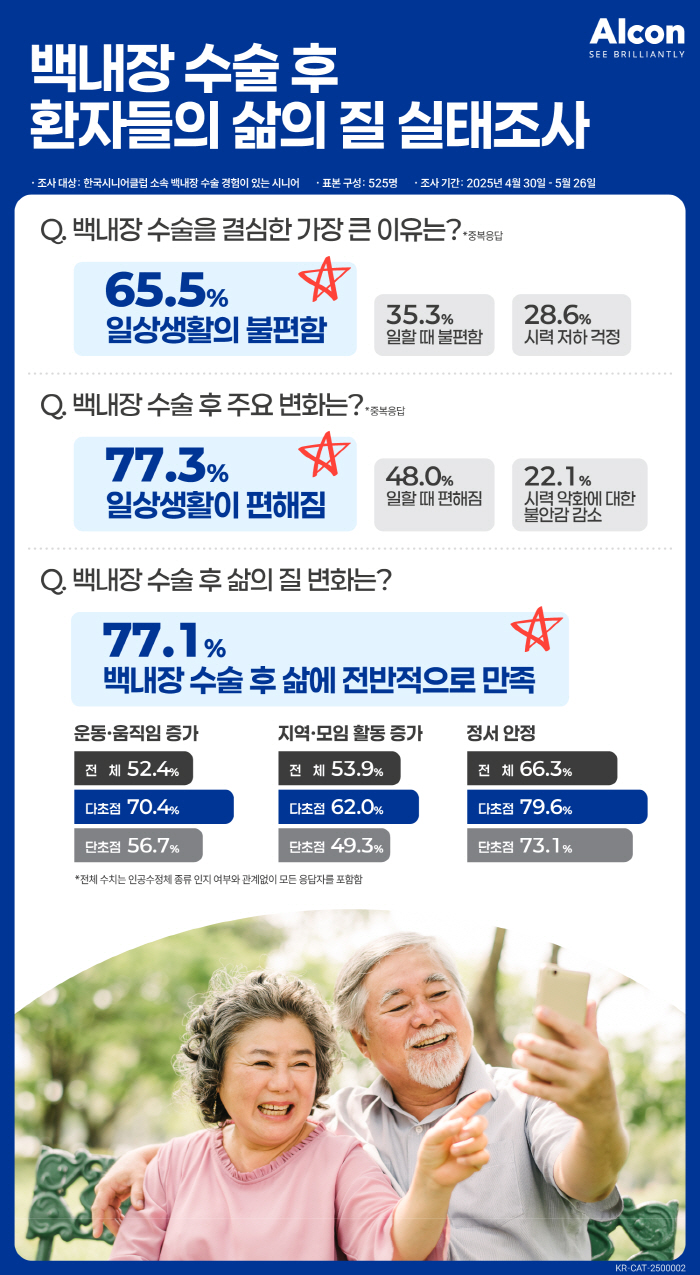77.3% of seniors experience cataract surgery, making daily life easier
|
Cataracts are a typical geriatric ophthalmic disease that often occurs as the lens of the eye becomes cloudy with aging. Major symptoms include decreased vision, blurred vision, and light spreading, and the number of elderly patients is rapidly increasing due to the rapid increase in the incidence rate from the 50s. If cataracts are not treated in time, it can lead to blindness if severe beyond the inconvenience of daily life, so early diagnosis and proper management are important. To date, artificial lens implantation is known as the only treatment.
Alcon, an ophthalmology company, conducted a survey with the Korea Senior Club Association on 「Changes in quality of life before and after cataract surgery」 to mark Cataract Awareness Month in June and found that cataract surgery contributes to the improvement of quality of life for seniors. The survey was conducted from April 30 to May 26, 2025 on 525 senior citizens from senior job centers nationwide who have experience in cataract surgery over the age of 60.
As a result of the survey, the main reason for deciding cataract surgery was the discomfort of daily life '(65.5%), which was a common motive regardless of gender and age group. This was followed by 'uncomfortable at work'(36.0%) and 'worry about vision loss'(33.3%). Older people in their 70s and older focus more on resolving daily discomfort and maintaining independent daily life, while in younger seniors in their 60s, economic activity continuity and prevention of vision loss were found to be more important motives.
In addition, more than 3 out of 4 respondents (77.3%) answered that 'daily life has become easier' as a satisfaction factor after cataract surgery, showing clear satisfaction in terms of 'daily discomfort relief', which was the main motive for surgery. Next, nearly half of the respondents (48.0%) cited 'positive changes in job performance due to improved vision' and 'reducing anxiety about deteriorating vision' (22.1%) as satisfaction factors.
When asked about specific life changes, 7 out of 10 seniors answered that daily activities such as reading, watching TV, and going out have become more active than before, so cataract surgery has a positive effect on the recovery of life activity. In addition, 52.4% said their physical activity increased after cataract surgery and 53.9% said their participation in social activities became active, indicating that more than half of the respondents felt positive changes in physical and social activities.
Meanwhile, 66.3% of the respondents said they had become emotionally comfortable after surgery, and 22.1% said they had reduced anxiety about deteriorating vision, indicating that cataract surgery had a positive effect on seniors' psychological anxiety and improved emotional quality of life.
In addition, about 77.1% of seniors who underwent cataract surgery responded that they are satisfied with their lives. In particular, the longer the postoperative period, the higher the life satisfaction, and these changes were common regardless of the type of artificial lens inserted.
However, satisfaction with life showed a significant correlation with the evaluation of the inserted artificial lens. While 66.9% of all respondents said they were satisfied with the prosthetic lens inserted, this percentage rose to 78.5% in seniors who positively evaluated life satisfaction.
In the survey, more active improvements in daily and social activities were found in seniors who chose multifocal lenses in increasing physical activity (70.4% in multifocal, 56.7%) and participation in external activities (62.0% in multifocal, 49.3% in short). This is an analysis that shows that the selection of artificial lenses considering lifestyle actually contributes to both the recovery of physical vitality and strengthening social connection of seniors.
Choi Joon-ho, head of Alcon Surgical's Korea division, said "This survey confirmed with the data that cataract surgery has positive changes in senior life as a whole."As cataract surgery is an important treatment that affects vision throughout life, it is of utmost importance for patients and guardians to consult with medical staff sufficiently to select an artificial lens that meets the individual's eye health as well as lifestyle and vision needs."
This article was translated by Naver AI translator.




